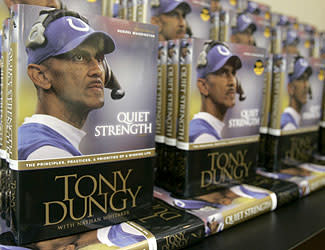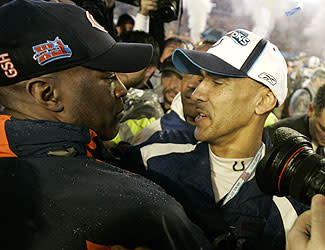Dungy's legacy marked by depth of personality
It was January of 2007 and Reggie Wayne was at the Ice Ultra Lounge, a downtown Indianapolis club, celebrating another Colts playoff victory. Wayne and some teammates were charging toward the Super Bowl when a woman at the club came up behind him and tried to steal his hat – not before she punched him in the head a few times.
Wayne spun around, cocked his fist and admits that, "she damn near got it … an ass-whupping."

Dungy's book, "Quiet Strength", chronicles his journey from Jackson, Mich., to Super Bowl XLI.
(Darron Cummings/AP Photo)
Then a vision of Tony Dungy flashed through his mind. There was the gentlemanly Colts coach, not warning Wayne that he'd be suspended, not lecturing him about how this could cost the team the championship, but simply looking at him. Wayne lowered his hand, got security to retrieve the hat and in a magnanimous and perhaps even Christian-like gesture, talked them into letting her stay and continue to party.
"It's not, 'I'll get in trouble,' " Wayne told Yahoo! Sports' Michael Silver a few years ago. "I see his face in my head, and I think, 'I don't want to disappoint him.' "
Tony Dungy will announce his retirement Monday according to FOXSports.com. The Colts have scheduled a 5 p.m. ET news conference.
Dungy will end (at least for the time being) a pioneering and highly successful 13-season career that saw his teams in Indy and Tampa win 139 regular season games (a stunning 10.7 wins a year) and advance to the playoffs 11 times.
A few weeks after Reggie Wayne didn't "ass-whup" some woman in Indiana, Dungy captured a long-awaited Super Bowl, the first black coach to accomplish the feat.
His racial impact in a sport where head-coaching opportunities are scarce for minorities – particularly at the college and high school levels – is considerable. However it wasn't the color of Dungy's skin that made him unique but the depth of his personality.
He was a throw back in an era of the thrown headset, a devout Christian who practiced the human decency he heard preached.
He was the guy who showed you could win big, earn the respect of your players and even discipline in the hot-headed moments of a potential night club scrap – not by bullying and intimidation but through respect and example.
Too often coaches act like lunatics as they stomp the sideline in over-the-top rage. Dungy, often in his Colts blue sweater vest, was a neighborly exception.
It was never about him, just the team. You can't be a NFL head coach without ego and ambition, but this was not about the glory of Tony Dungy. He was not a look at me, look at the genius, kind of figure.
He proved that you could win by working with players, not just shouting at them. You can only wonder if – and hope – his influence spread down into the college and high school ranks.
However, he was just as good off the field.
He treated his players like he would like to be treated. It was the same for assistants, staffers, media, stadium workers and so forth. But there was controversy. His support of political and religious groups who preach an anti-gay message was troublesome.
As a coach, that Super Bowl triumph over the Bears two years ago eased many of the criticisms about playoff collapses and misused talent. He was already known for helping devise the Tampa 2 defense that is employed across the league. Some of his former assistants have become head coaches, including the Steelers' Mike Tomlin and the Bears' Lovie Smith.
In football terms, getting just one title out of Peyton Manning and company – and none out of Tampa Bay where Jon Gruden won the title the year after Dungy left – can be debated forever.
Dungy would be the first to say he wished he had accomplished more.

Dungy with Smith following the Super Bowl.
(David Duprey/AP Photo)
In his own way, he did. He became one of the NFL's most popular figures because of the way he carried himself in victory and defeat. He was a role model to many who hardly cared about football.
He became the face of tragedy when in December 2005 he and his wife Lauren dealt with the suicide of a son, James. It is every parent's worst nightmare. He valiantly, and publicly, mourned before dedicating himself to suicide prevention programs.
Soon after, he wrote an autobiography that went No. 1 on the New York Times bestseller charts, a rarity for a football coach or player. That was Dungy being more.
The 53-year-old Jackson, Mich., native had been considering a move away from the grind of head coaching for a few years. The Colts set up a succession plan last year so offensive assistant Jim Caldwell automatically takes over.
This may be the last we see of Dungy on the sidelines, but he may wind up even more visible … if that's possible. His charity work and opportunities to speak about his faith and leadership style are endless. His post-coaching impact will be far greater than just clowning it up on some silly pregame show.
If he could find a way to get through to Reggie Wayne in the very second his guidance was needed most, then who knows who he's capable of reaching?
Monday Dungy's decision was the NFL's loss, perhaps everyone else's gain.
